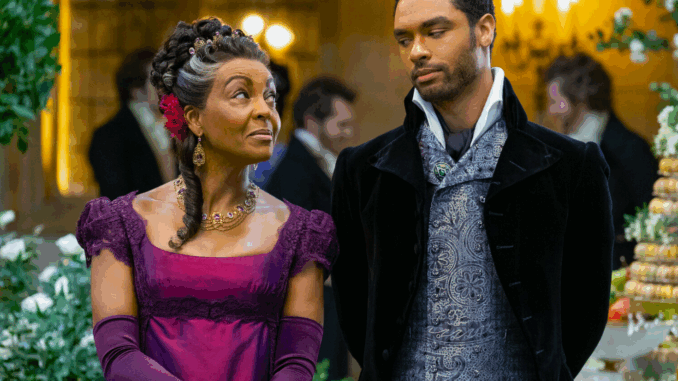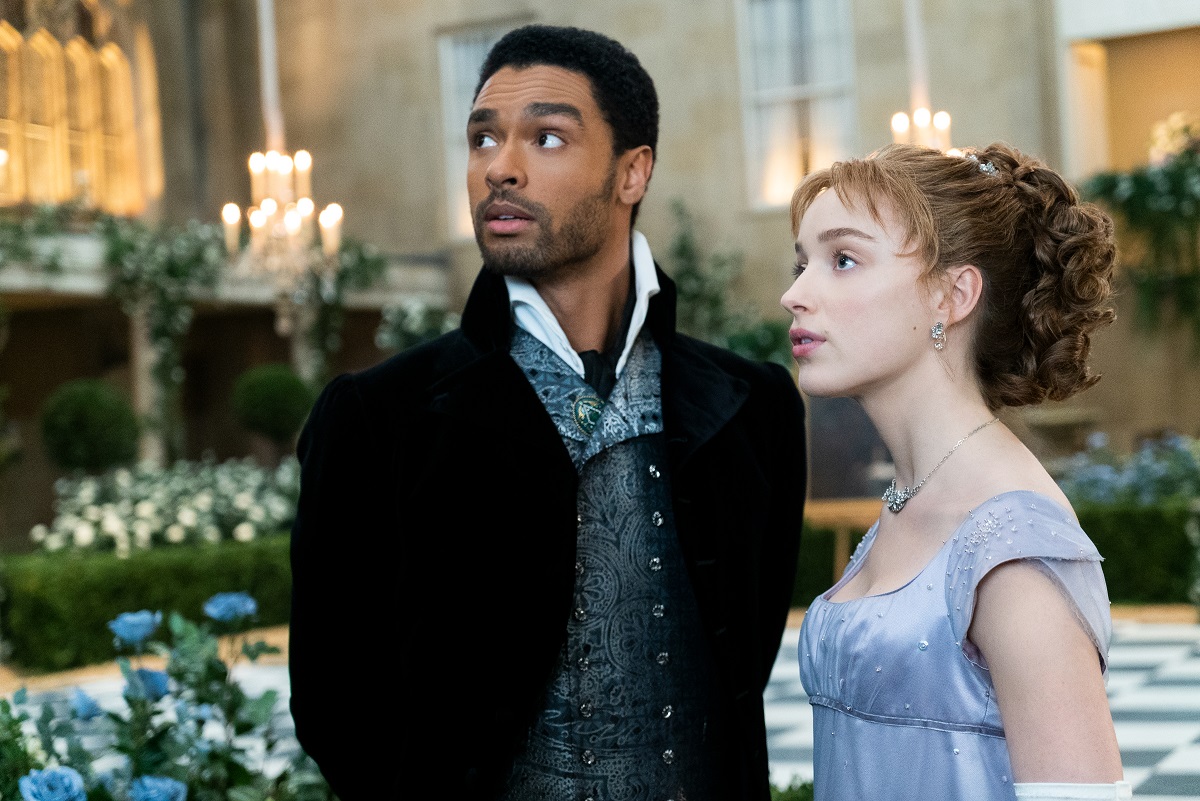
A Fantasy Draped in Silk and Scandal
When Bridgerton first exploded onto Netflix in December 2020, it looked like a dream. Elegant gowns, stolen glances, orchestral covers of pop songs, and a Duke whose smolder could melt a chandelier.
Viewers binged it in a pandemic haze, desperate for escape. But Bridgerton was never just a love story wrapped in Empire waistlines. It was—and still is—a glittering, complicated fantasy about race, class, gender, and desire.
Now, four seasons in, the question isn’t just who will find love next?
It’s: what exactly are we watching?
The World According to Shonda Rhimes
Created by Scandal mastermind Shonda Rhimes and produced under her Shondaland banner, Bridgerton reimagines Regency-era England through a bold (and controversial) lens: a racially integrated aristocracy where Black dukes, Indian viscountesses, and mixed-race royalty are not exceptions, but norms.
It’s an alternate history—a genre-bending sandbox where beauty and power aren’t confined to whiteness.
To some, it’s progress. To others, it’s a sanitized fantasy that avoids the harder truths.
Shonda Rhimes has made clear: this world isn’t meant to be accurate—it’s meant to be inclusive. And in a landscape where period dramas have long excluded people of color entirely, that alone is a powerful act.
The Politics Beneath the Petticoats
On the surface, Bridgerton is about courtship. But its real drama lies beneath the corsets.
Lady Whistledown’s gossip papers echo the surveillance women have long endured. Eloise’s rebellion exposes the limits of female agency—even in a society obsessed with propriety. Penelope’s longing reflects the brutal invisibility of plus-sized women in romance narratives.
And then there’s the issue of sex. Unlike other period dramas, Bridgerton doesn’t shy away from it. Bodies aren’t just touched—they’re explored, worshiped, and negotiated.
But who gets those moments? Who gets to burn with desire, and who’s left on the sidelines? The show’s treatment of queer characters, for example, still feels timid. For all its daring, Bridgerton remains surprisingly straight.
Season by Season, Love as Resistance

Each season centers on a different Bridgerton sibling and their journey toward love—but also, identity.
-
Daphne and Simon’s season felt like a Regency Fifty Shades, but it explored the trauma of emotional repression and gender roles.
-
Anthony and Kate gave us the enemies-to-lovers slow burn we craved, but also dissected duty vs. freedom, especially for immigrant families.
-
Colin and Penelope (Polin) showed us how long it can take to really see someone—especially when they’ve been hiding in plain sight.
These aren’t just romances. They’re quiet revolutions.
Love, in Bridgerton, is more than a happy ending. It’s a weapon against social expectation, a threat to hierarchy. In this fantasy world, love doesn’t just heal—it destabilizes.
The Cost of Escapism
For all its beauty, Bridgerton walks a tightrope. It wants to feel modern—but still romantic. Progressive—but still palatable. Diverse—but not political.
This creates tension. It dodges topics like slavery, colonialism, and the economic realities of empire. Queen Charlotte, a Black monarch in this reimagining, is presented as powerful but isolated—her Blackness rarely explored with nuance.
Some critics ask: Is this really representation? Or just casting with a gloss of progressivism?
But perhaps Bridgerton isn’t trying to solve these questions. It may simply be trying to open a space where they can be asked—loudly, gorgeously, and with a string quartet playing Ariana Grande in the background.
What Keeps Us Coming Back
Despite any criticism, the show’s magnetism is undeniable. It’s not just the gowns, the kisses, or even the drama.
It’s the yearning.
Bridgerton excels at capturing desire—not just romantic, but existential. The desire to be chosen. To be seen. To escape expectation.
Every ball, every duel, every secret letter pulses with the tension of people trying to become more than their roles. That’s what makes the show feel modern, even when it’s dressed in 1813.
In a time when dating feels like doomscrolling, Bridgerton gives us old-fashioned romance without the old-fashioned erasure. It reminds us that love, when fully seen and fully felt, is still radical.
Final Thoughts: Gowns Are Easy. Change Is Harder.
Bridgerton is not perfect. It’s not even trying to be.
It’s a glossy, sensual, high-stakes fantasy that dares to put brown skin in ballrooms and give women the agency to pursue their pleasure. But it also struggles to interrogate the very systems it glamorizes.
Yet in that contradiction lies its power. Because maybe Bridgerton isn’t about what history was—but what we wish it could have been.
And sometimes, dreaming out loud—through diamonds, dukes, and scandals—is where all great change begins.